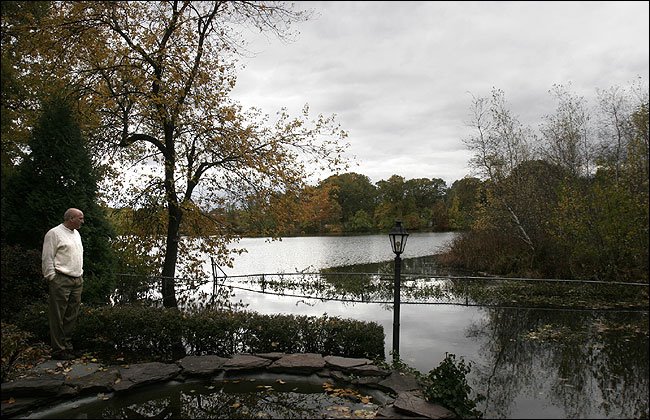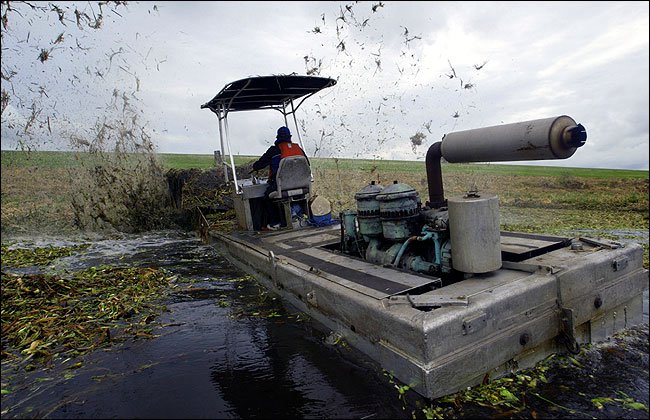Floating islands gone wild
Or when islands attack.
 [Image: Photo by Jodi Hilton for the New York Times].
[Image: Photo by Jodi Hilton for the New York Times].
An ominous, mobile island in Massachusetts "has been floating for as long as anyone can remember, buoyed by a mat of sphagnum moss and gases from decomposing plants. It is a curiosity and sometimes a nuisance" – because it has quite a temper.
"'Normally when it floats you can actually hear the roots rip – it sounds like ripping up carpet,' said [Andrew] Renna, 51, a roofing and siding sales manager. 'But this time, it didn't make any noise.'"
"This time," that is, it crept over, floating, silent but deadly, and it crushed Mr. Renna's tomatoes.
"Sometimes it boings mischievously around," the New York Times explains, "as if the pond were a pinball machine, sailing, for example, into Richard and Beverly Vears's backyard just hours after they moved in."
Thus began a whole new genre of practical joke: the terrestrial psych-out.
The island's new position in the Vears's backyard "gave a neighbor a perfect welcome gag: telling the Vearses he was a tax collector who would charge them for the extra property."
 [Image: Infographic courtesy of the New York Times].
[Image: Infographic courtesy of the New York Times].
This and other such "floating bogs" have been anchored, moored, tied-up, chained, even towed away by speedboats (giving Robert Smithson quite a run for his money) – but they just keep breaking free.
Sometimes their unstoppable urge for tectonic liberation calls for nothing less than "extreme island annihilation."
 [Image: Photo by Alex Quesada for the New York Times].
[Image: Photo by Alex Quesada for the New York Times].
Islands such as these "usually form in wetlands, where plants take root in peaty soil or sphagnum moss in a shallow lake or riverbed, said Dave Walker, a senior project manager with the St. Johns River Water Management District in Florida, where, he said, 'you can get acres and acres of floating islands on a lake.'"
Fascinatingly, "[s]ome experts believe that floating islands are becoming more common or lasting longer in some places, especially where human encroachment has created reservoirs or where fertilizer use has made certain plants grow faster."
In any case, you can actually buy these things, or have them made for you – this is referred to as "island deployment" – and you can get them customized, as well. Pimp My Floating Bog.
You are, in fact, urged to "Think about it. Dream about it. Experience it yourself" – leading one to wonder what "it" really is.
How much do you want to know?
 [Image: Photo by Jodi Hilton for the New York Times].
[Image: Photo by Jodi Hilton for the New York Times].An ominous, mobile island in Massachusetts "has been floating for as long as anyone can remember, buoyed by a mat of sphagnum moss and gases from decomposing plants. It is a curiosity and sometimes a nuisance" – because it has quite a temper.
"'Normally when it floats you can actually hear the roots rip – it sounds like ripping up carpet,' said [Andrew] Renna, 51, a roofing and siding sales manager. 'But this time, it didn't make any noise.'"
"This time," that is, it crept over, floating, silent but deadly, and it crushed Mr. Renna's tomatoes.
"Sometimes it boings mischievously around," the New York Times explains, "as if the pond were a pinball machine, sailing, for example, into Richard and Beverly Vears's backyard just hours after they moved in."
Thus began a whole new genre of practical joke: the terrestrial psych-out.
The island's new position in the Vears's backyard "gave a neighbor a perfect welcome gag: telling the Vearses he was a tax collector who would charge them for the extra property."
 [Image: Infographic courtesy of the New York Times].
[Image: Infographic courtesy of the New York Times].This and other such "floating bogs" have been anchored, moored, tied-up, chained, even towed away by speedboats (giving Robert Smithson quite a run for his money) – but they just keep breaking free.
Sometimes their unstoppable urge for tectonic liberation calls for nothing less than "extreme island annihilation."
 [Image: Photo by Alex Quesada for the New York Times].
[Image: Photo by Alex Quesada for the New York Times].Islands such as these "usually form in wetlands, where plants take root in peaty soil or sphagnum moss in a shallow lake or riverbed, said Dave Walker, a senior project manager with the St. Johns River Water Management District in Florida, where, he said, 'you can get acres and acres of floating islands on a lake.'"
Fascinatingly, "[s]ome experts believe that floating islands are becoming more common or lasting longer in some places, especially where human encroachment has created reservoirs or where fertilizer use has made certain plants grow faster."
In any case, you can actually buy these things, or have them made for you – this is referred to as "island deployment" – and you can get them customized, as well. Pimp My Floating Bog.
You are, in fact, urged to "Think about it. Dream about it. Experience it yourself" – leading one to wonder what "it" really is.
How much do you want to know?





Comments are moderated.
If it's not spam, it will appear here shortly!
Post a Comment